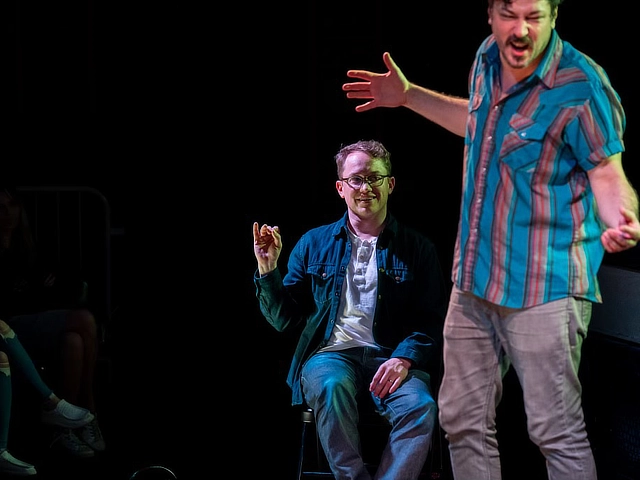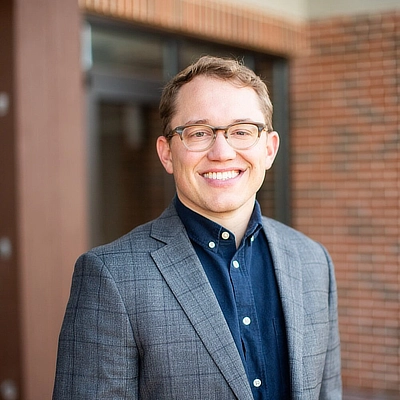
I am a pastor with a bizarre little hobby. For about 15 years now I have been connected to improvisational theater, or improv, as it’s more commonly known. Around the time I graduated seminary I also started learning and performing improv comedy in Birmingham. I often joke, to learn about God I went to seminary, but to learn about Man I went to comedy. Ha!
As God has called me to different ministry posts, I’ve continued learning about and performing improv wherever God has called me. However, more than being a fun side project, simply an opportunity to meet new people and explore my creativity, I have come to believe that improv is a useful tool for developing and increasing our faith in God and our faithfulness to God.
The basic rule for improv is “yes, and.” On stage an improv group has no idea what they are about to perform. They have no scripted lines, no established dialogue, no pre-set beats, no plot, no characters, nothing. Everything that happens on stage is created in the moment by a team of players who commit to the rule of “yes, and.”
The rule of “yes, and” means that each player says “yes” to whatever is offered by the other players. If one player enters a scene and says, “Hey dad, let’s play catch!” then the second player should say “yes” to the fact that the first player is their child, “and” agree to spend time together playing catch. If the second player instead says something like, “Sir, this is a Wendy’s,” it may get a laugh, but it would trainwreck the scene.
Scenes must be built on agreement and saying “yes” indicates that both players agree that what was just said is true. A better response would be, “Sure Son! I hope you win the championship, something I never did.” This response says “yes” to the relationship and activity of the two players on stage, then offers the “and” of a response that builds the scene further. This scene now has two established characters, an activity they are sharing, and some thoughtful themes to explore, including fathers who may or may not live vicariously through their sons. All this in two lines!
We can break down the rule of “yes, and” even further. “Yes, and” consists of three steps: listening, agreeing, and responding.
Listening involves hearing what the scene partner is saying, both with their words, their tone, and their actions. You can imagine one character saying, “I love you” in a variety of ways, each with a different inflection point. Each different inflection can help you learn more about that character and how they think or feel! The most important piece of improv is listening.
The second step is agreeing. This means agreeing to the base reality of the scene. If one player calls another player dad, then he is dad. If one player says they are in a grocery store, then the entire scene is in a grocery store. If the player mimes that he is holding a briefcase, but another player says he is holding a chihuahua, then guess what? He’s holding a chihuahua! (The next step would be to figure out why he holds chihuahuas like briefcases, but we can figure that out when we get there.) Agreement is vital because it provides the common foundation around which the scene is built.
The final step is responding. The other players respond to what has been offered or initiated, based on what they’ve listened and agreed to, with something that moves the scene forward. One line at a time, one piece of new information at a time, one scene at a time, by saying “yes, and” an improv group can create thoughtful, compelling, beautiful theater in the moment.
I believe that we can deepen our faith when we practice improvisation with God. It’s weird to say we improvise with God, because he is the omniscient, omnipotent, omnipresent God who created all things, is he not? Yet, in our relationship with God, what would happen if we were practiced in saying “yes, and” even when we don’t know what might happen next?
Hebrews 11:8 tells us, “By faith Abraham obeyed when he was called to go out to a place that he was to receive as an inheritance. And he went out, not knowing where he was going.” God called Abraham, and Abraham did not know what was going to happen next. God’s call was unforeseen, but Abraham said yes, and he want to where God called him. Abraham’s “yes, and” is celebrated as faithfulness.
Do we say “yes, and” to God? Are we practiced at listening to God? God speaks through His Word, through His Holy Spirit, through prayer, through His Creation, through the art and beauty of His people, through our church communities, and more. Do we hear His voice? And, when we hear His voice, do we agree to it?
Do we surrender to the sovereignty of God? Do we recognize that His ways are better than our ways, even if they were unexpected? And lastly, how do we respond? Do we respond faithfully? Are we obedient to His commands, gracious in our words, and faithful in our responses to God?
The beauty of improvisation is that it can help prepare you for the unforeseen and unexpected. If we consider faithfulness as a part of our improvisation with God, then we can become better improvisers and more faithful disciples. We can be practiced at listening, agreeing, and responding to God regardless of the circumstance. Like players on the improv stage who do not know what happens next, we are equipped to move forward with boldness and joy by saying “yes, and” to God.
 Jacob Simmons is the Pastor of Hope Community Church in Birmingham, AL. He is also one of the founders of the Faraway Theater, an improv theater in the heart of Birmingham. Jacob trained in improv at the iO theater in Chicago, and currently performs with his group, Gladys. Jacob is working towards a PhD in Preaching at Midwestern Baptist Theological Seminary and has held positions on the staff of churches in Hendersonville, Birmingham, London, and Chicago. He is happily married to Suzanne, and they are proud parents of two children, John, and Bea. Join Jacob and his improv team live on May 21 for an improv night and lecture on faith, communication, and unexpected stories, sponsored by the Rabbit Room. Learn more.
Jacob Simmons is the Pastor of Hope Community Church in Birmingham, AL. He is also one of the founders of the Faraway Theater, an improv theater in the heart of Birmingham. Jacob trained in improv at the iO theater in Chicago, and currently performs with his group, Gladys. Jacob is working towards a PhD in Preaching at Midwestern Baptist Theological Seminary and has held positions on the staff of churches in Hendersonville, Birmingham, London, and Chicago. He is happily married to Suzanne, and they are proud parents of two children, John, and Bea. Join Jacob and his improv team live on May 21 for an improv night and lecture on faith, communication, and unexpected stories, sponsored by the Rabbit Room. Learn more.
We invite you to join us for Animate 2024! By registering for Animate, you will have the chance to choose an artistic track that sparks your interest and select from a variety of toolbox classes. Our exceptional Samford Faculty, as well as guest artists who are experts in their respective fields will be your instructors. Toolbox classes for 2024 include an Improv Comedy class taught by the author of this post, Jacob Simmons.
For additional reading, check-out:
- How Poetry Helps Us Dwell in Difficulty by Samford Assistant English Professor, and Animate 2024 poetry toolbox instructor, Olivia Milroy Evans.
- Gospel: The Message Behind the Music by Nate Glasper, Animate 2024 worship leader.
- Praying New Ways with Old Psalms by Rev. Sarah Smoot, Animate 2024 Preacher.
